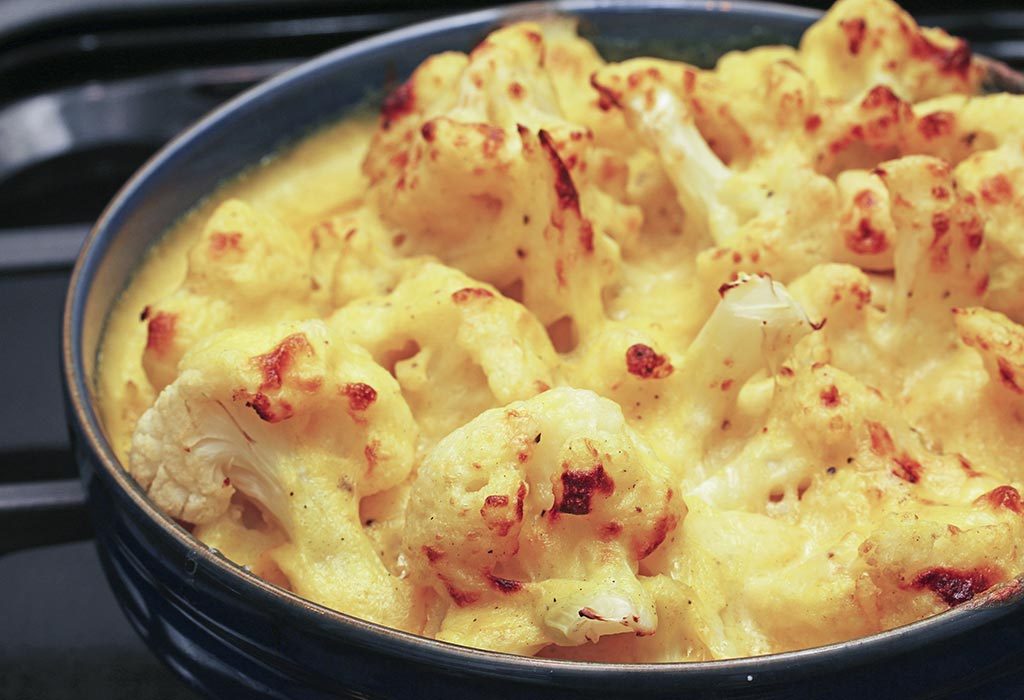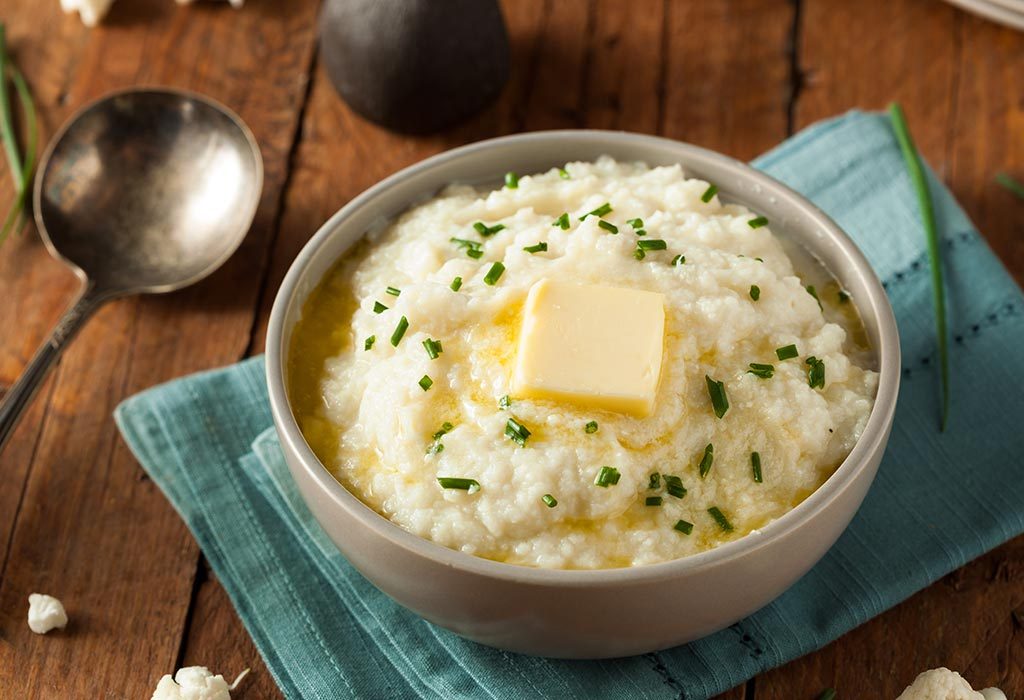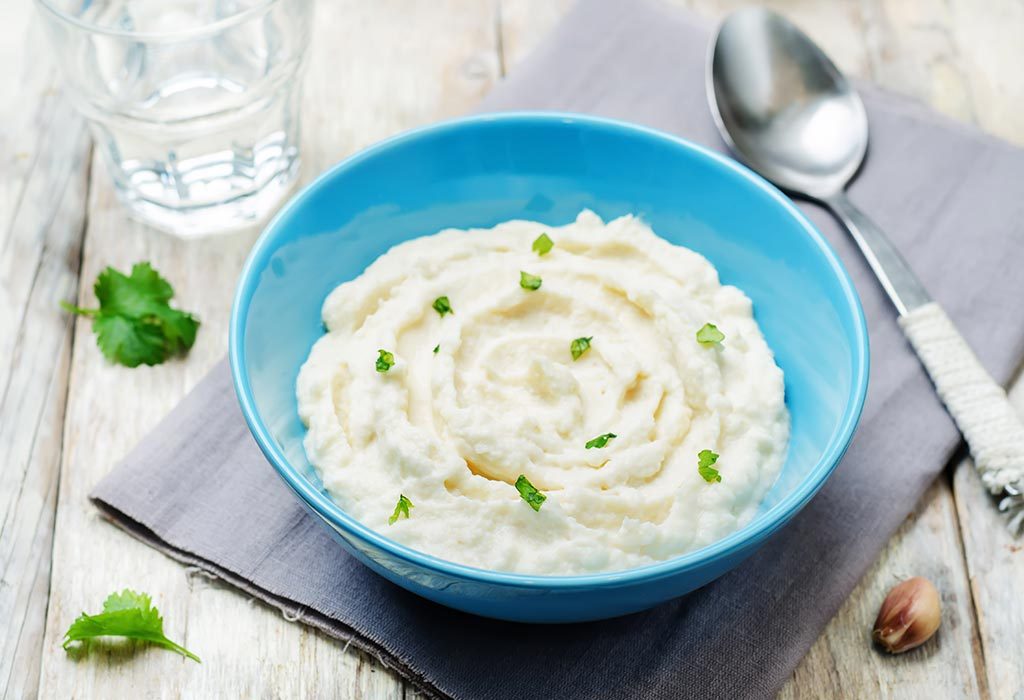In this Article
While introducing your baby to the world of semi-solid and solid foods, it is important to know which vegetables to add to his diet and at what age. This knowledge is especially necessary when you are opting to make your own baby food at home. Homemade food allows better control of the ingredients that are fed to your little one. Like many mothers, if you are troubled by the query “is cauliflower good for babies”, we have good news for you – Cauliflower can prove to be a great addition to your child’s diet and help in providing necessary nutrients for wholesome growth.
When Can You Introduce Cauliflower to Babies?
Cauliflower is a highly versatile vegetable that contains Folate, Calcium, Vitamin A & C and is high in fibre too. You can introduce your baby to cauliflower when he is between 8 to 10 months old. Starting with cauliflower at an earlier age is not recommended since the vegetable is slightly difficult to digest and could cause gas. The baby’s digestive system is not fully developed until he is above six months of age and hence it is better to wait. This could cause discomfort and pain in some cases too. It is best to consult with your doctor before doing so, especially if your tiny tot has an over-sensitive stomach. Although cauliflower isn’t known to cause allergies in babies, it is best to introduce it separately so in case of any adverse reaction, it will be easy to identify the cause.
Nutritional Value of Cauliflower
Cauliflower is a cruciferous vegetable that contains phytochemicals which helps to prevent cancer. Here is the nutritional value of cauliflower in terms of minerals and vitamins:
| Minerals | Vitamins |
| Potassium – 176 mg | Vitamin C – 54.9 mg |
| Phosphorus – 40 mg | Vitamin A – 15 IU |
| Calcium – 20 mg | Vitamin B6 – .21 mg |
| Sodium – 19 mg | Folate – 55 mcg |
| Magnesium – 11 mg | Niacin – .5 mg |
| Iron – .40 mg | Thiamine – .05 mg |
| Manganese, Copper, Zinc and Selenium in small quantities | Lutein – 36 mcg |
| Pantothenic Acid – .6 mg |
Source: http://wholesomebabyfood.momtastic.com/cauliflowerbabyfoodrecipes.htm
Benefits of Cauliflower for Babies
The following are the benefits of cauliflower if you include it to your baby’s diet:
1. Good for the skin
Since cauliflower contains sulforaphane, it protects the baby’s skin against the harmful effects of ultra-violet rays. Other skin conditions like inflammations, cellular damage, skin cancer and erythema are also prevented.
2. Good for bones
Cauliflower provides Vitamin C to the body which makes the baby’s bones stronger and healthier. It enhances the production of collagen so that our bones and joints are protected from inflammatory damage. It also contains Vitamin K which is beneficial for the baby’s bones.

3. Prevents stomach disorders
The high fibre content in cauliflower aids digestion and helps in removing toxins from our body. It doesn’t allow the growth of certain bacteria by protecting the stomach lining. Cauliflower also helps to deal with many kinds of stomach disorders.
4. Takes care of the heart and cardiovascular systems
The presence of sulforaphane in cauliflower helps to improve the functioning of the heart and kidney. Since it contains Vitamin K and glucoraphanin, the baby’s blood vessels are maintained along with good blood circulation.
How to Select & Store Cauliflower
When you visit the market to purchase cauliflower for the baby, choose the one that is heavy for its size. Ensure the leaves are green, fresh-looking and have that “crunch”. The cauliflower is certainly a stale one if its leaves are pale in colour and are droopy. The cauliflower with more leaves on its head helps in keeping the centre (curd) fresh by protecting it. A creamy white coloured curd means that the cauliflower is fresh while brown spots, dull exteriors and the presence of small flowers mean that it is old and rapidly losing its nutritional value.
It is best to avoid frozen cauliflower unless you plan to use it for making soup. Frozen cauliflower can become extremely soggy after it is cooked. Even the cauliflower puree baby boys and girls love, doesn’t taste too well. While storing cauliflower, you should keep its stem side up in order to keep the moisture content from accumulating on the curd. Do not store cauliflower in a plastic bag as this encourages the accumulation of moisture which hastens the decaying process. You can use a paper bag or no bag at all. Fresh cauliflower will retain all its nutrients and qualities for about a week when kept in the refrigerator.
How to Cook Cauliflower for your Baby?
It is very simple to cook cauliflower as it involves removing the green leaves and cutting the florets just above the stem. Once done, wash it thoroughly under running water to clean it properly. Cut the curd into small-sized florets, preferably of the same size to help it to cook in an even way. After you have cut the cauliflower into pieces, allow it to sit in a bowl of water to help the health-enhancing phytonutrients to develop.
It is best to steam the cauliflower florets which takes around 8-10 minutes or they can be boiled for about five minutes. Steaming is preferred as boiling can drain some of its nutrients into the water. To ensure the nutrients are routed back into your baby’s food, use the water while making cauliflower puree for your little one. Cauliflower can be roasted and even eaten raw when your child grows up but it is best to cook it when it is an infant.
Easy Cauliflower Recipes for Baby
Your little one will love the taste of cauliflower if you cook the right way by adding different ingredients to enhance its taste and retain its nutritional values. Here are a few handpicked recipes to get you started the easy way:
1. Baked Cauliflower Cheese
This is the simplest way to serve cauliflower to your baby.
Ingredients
- One small cauliflower
- ¾ cup Milk
- 4 tsp unsalted butter
- 2 teaspoons of flour
- 2 tablespoons of fresh whole wheat bread crumbs
- ¼ cup of grated Parmesan cheese
- ¼ cup of grated Cheddar cheese
- A pinch of nutmeg

Method
Wash the cauliflower under running water before cutting it into small florets which can be steamed later. In the meantime, melt 2 teaspoons of butter in a pan and add the flour while stirring continuously. Add milk and bring it to boil. Cook until the mixture is thick and put the pan off the heat. Add nutmeg and Cheddar cheese. In a baking dish, add this mixture to the steamed cauliflower while stirring it well. Mix the Parmesan cheese with the breadcrumbs and sprinkle it over the mixture. Melt the rest of the butter and pour it over the crumbs. Bake this for about 20-30 minutes till the mix turns into a delicious golden brown colour. This cauliflower cheese baby food recipe is bound to be a hit with kids and mothers as well.
2. Mashed Potatoes
Add some cauliflower to the classic mashed potato recipe.
Ingredients
- 4 cauliflower turrets
- 200 grams potatoes
- 2 teaspoons of olive oil
- 3 tablespoons of warm milk
- ¼ cup of grated cheddar cheese
- 1 tablespoon diced chives or spring onions

Method
Peel the potatoes, cut them into long pieces and allow them to simmer in water for about 10 minutes. Add the cauliflower turrets and cool for about 8-10 minutes more till the mix turns tender. Drain the water and mash the potatoes along with the cauliflower while adding the cheese and chives. Pour the milk and olive oil and your nutrient-packed mashed potato is ready.
3. Cauliflower- Basic Puree
This is a simple puree with only cauliflower.
Ingredients
- 1 Cauliflower

Method
Wash the cauliflower clean under running water. Remove the green leaves to get to the curd. Remember to use only the florets to make the puree so you get a smooth and tasty puree. Put it into a pan and steam it until it becomes tender. Put it into a blender and run it till it turns into a smooth puree. You can add a little water if you feel you need more consistency. To make it tastier, you could consider adding an apple to it.
There are many health benefits associated with cauliflower and your baby will certainly gain if you decide to add it to its meal. Of course, you will have to cook up a few tasty recipes to get your little one hooked on to it and eat it without much of a fuss. However, before introducing your little one to solid foods, it is recommended to speak to your child’s paediatrician and discuss any allergy risks that can be associated at this age.









